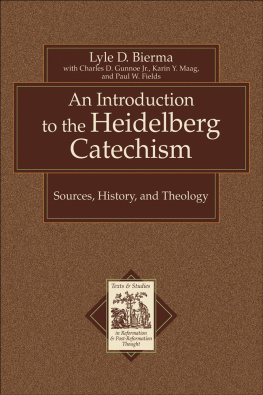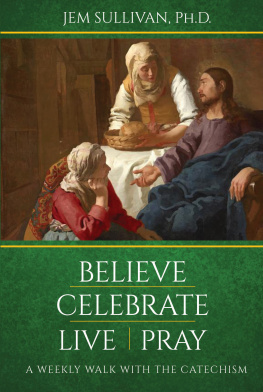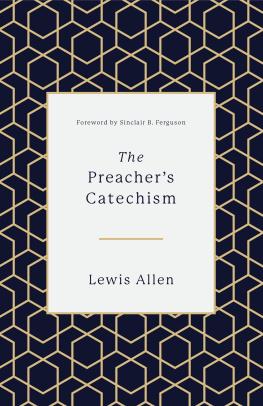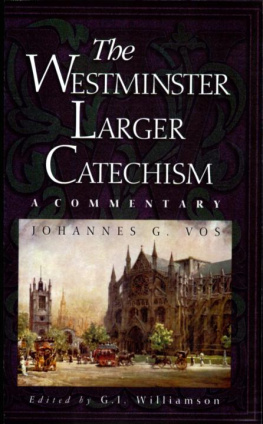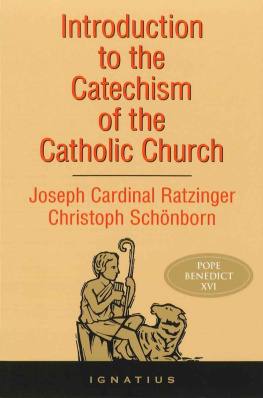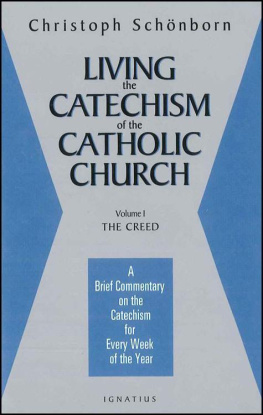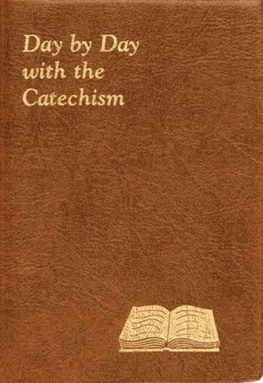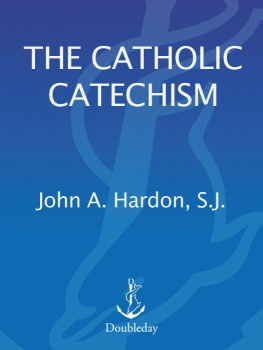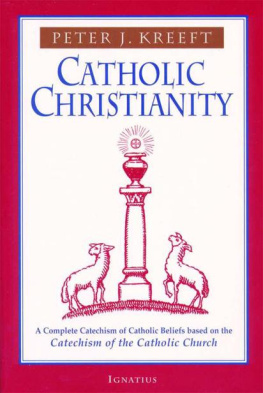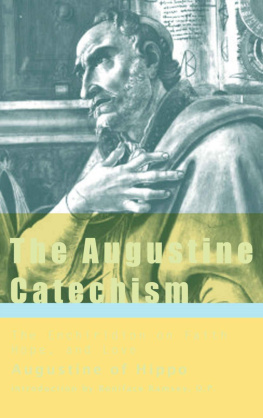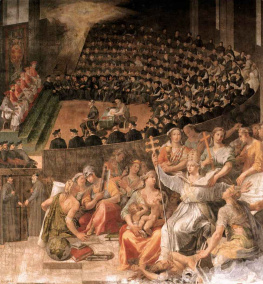Lyle D. Bierma - An Introduction to the Heidelberg Catechism: Sources, History, and Theology
Here you can read online Lyle D. Bierma - An Introduction to the Heidelberg Catechism: Sources, History, and Theology full text of the book (entire story) in english for free. Download pdf and epub, get meaning, cover and reviews about this ebook. year: 2005, publisher: Baker Academic, genre: Religion. Description of the work, (preface) as well as reviews are available. Best literature library LitArk.com created for fans of good reading and offers a wide selection of genres:
Romance novel
Science fiction
Adventure
Detective
Science
History
Home and family
Prose
Art
Politics
Computer
Non-fiction
Religion
Business
Children
Humor
Choose a favorite category and find really read worthwhile books. Enjoy immersion in the world of imagination, feel the emotions of the characters or learn something new for yourself, make an fascinating discovery.
- Book:An Introduction to the Heidelberg Catechism: Sources, History, and Theology
- Author:
- Publisher:Baker Academic
- Genre:
- Year:2005
- Rating:3 / 5
- Favourites:Add to favourites
- Your mark:
- 60
- 1
- 2
- 3
- 4
- 5
An Introduction to the Heidelberg Catechism: Sources, History, and Theology: summary, description and annotation
We offer to read an annotation, description, summary or preface (depends on what the author of the book "An Introduction to the Heidelberg Catechism: Sources, History, and Theology" wrote himself). If you haven't found the necessary information about the book — write in the comments, we will try to find it.
Lyle D. Bierma: author's other books
Who wrote An Introduction to the Heidelberg Catechism: Sources, History, and Theology? Find out the surname, the name of the author of the book and a list of all author's works by series.
An Introduction to the Heidelberg Catechism: Sources, History, and Theology — read online for free the complete book (whole text) full work
Below is the text of the book, divided by pages. System saving the place of the last page read, allows you to conveniently read the book "An Introduction to the Heidelberg Catechism: Sources, History, and Theology" online for free, without having to search again every time where you left off. Put a bookmark, and you can go to the page where you finished reading at any time.
Font size:
Interval:
Bookmark:
Texts and Studies in Reformation and Post-Reformation Thought
General Editor
Prof. Richard A. Muller, Calvin Theological Seminary
Editorial Board
Prof. Irena Backus, University of Geneva
Prof. A. N. S. Lane, London Bible College
Prof. Susan E. Schreiner, University of Chicago
Prof. David C. Steinmetz, Duke University
Prof. John L. Thompson, Fuller Theological Seminary
Prof. Willem J. van Asselt, University of Utrecht
Prof. Timothy J. Wengert, The Lutheran Theological Seminary at Philadelphia
Prof. Henry Zwaanstra, Calvin Theological Seminary
Caspar Olevianus, A Firm Foundation: An Aid to Interpreting the Heidelberg Catechism , translated and edited by Lyle D. Bierma.
John Calvin, The Bondage and Liberation of the Will: A Defence of the Orthodox Doctrine of Human Choice against Pighius , edited by A. N. S. Lane, translated by G. I. Davies.
Law and Gospel: Philip Melanchthons Debate with John Agricola of Eisleben over Poenitentia , by Timothy J. Wengert.
Martin Luther as Prophet, Teacher, and Hero: Images of the Reformer, 1520-1620 , by Robert Kolb.
Melanchthon in Europe: His Work and Influence beyond Wittenberg , edited by Karin Maag.
Reformation and Scholasticism: An Ecumenical Enterprise , edited by Willem J. van Asselt and Eef Dekker.
The Binding of God: Calvins Role in the Development of Covenant Theology , by Peter A. Lillback.
Divine Discourse: The Theological Methodology of John Owen , by Sebastian Rehnman.
Heinrich Bullinger and the Doctrine of Predestination: Author of the Other Reformed Tradition ? by Cornelis P. Venema.
Architect of Reformation: An Introduction to Heinrich Bullinger, 1504-1575 , edited by Bruce Gordon and Emidio Campi.
An Introduction to the Heidelberg Catechism: Sources, History, and Theology , by Lyle D. Bierma, with Charles D. Gunnoe, Jr, Karin Y. Maag, and Paul W. Fields.

2005 by Lyle D. Bierma
Published by Baker Academic
a division of Baker Publishing Group
P.O. Box 6287, Grand Rapids, MI 49516-6287
www.bakeracademic.com
Ebook edition created 2013
All rights reserved. No part of this publication may be reproduced, stored in a retrieval system, or transmitted in any form or by any meansfor example, electronic, photocopy, recordingwithout the prior written permission of the publisher. The only exception is brief quotations in printed reviews.
ISBN 978-1-4412-0662-6
Library of Congress Cataloging-in-Publication Data is on file at the Library of Congress, Washington, DC.
Table of Contents
Contributors
LYLE D. BIERMA (Ph.D., Duke University) is Professor of Systematic Theology at Calvin Theological Seminary, Grand Rapids, Michigan, and editor of the Calvin Theological Journal .
PAUL W. FIELDS (M.L.S., Syracuse University) is Theological Librarian and curator of the H. Henry Meeter Center for Calvin Studies at Calvin College and Calvin Theological Seminary, Grand Rapids, Michigan.
CHARLES D. GUNNOE JR. (Ph.D., University of Virginia) is Associate Professor of History and chairperson of the Department of History, Aquinas College, Grand Rapids, Michigan.
KARIN Y. MAAG (Ph.D., University of St. Andrews) is director of the H. Henry Meeter Center for Calvin Studies at Calvin College and Calvin Theological Seminary and Associate Professor of History at Calvin College, Grand Rapids, Michigan.
Series Preface
The heritage of the Reformation is of profound importance to the church in the present day. Yet there remain many significant gaps in our knowledge of the intellectual development of Protestantism in the sixteenth century, and there are not a few myths about the theology of the Protestant orthodox writers of the late sixteenth and seventeenth centuries. These gaps and myths, frequently caused by ignorance of the scope of a particular thinkers work, by negative generations, or by an intellectual imperialism of the present that singles out some thinkers and ignores others regardless of their relative significance to their own times, stand in the way of a substantive encounter with this important period in our history. Understanding and appropriation of that heritage can occur only through the publication of significant worksmonographs and sound, scholarly translationsthat present the breadth and detail of the thought of the Reformers and their successors.
Texts and Studies in Reformation and Post-Reformation Thought proposes to make available such works as Caspar Olevianuss Firm Foundation , Theodore Bezas Table of Predestination , and Jerome Zanchis Confession of Faith , together with significant monographs on traditional Reformed theology, under the guidance of an editorial board of recognized scholars in the field. Major older works, like Heppes Reformed Dogmatics , will be reprinted or reissued with new introductions. These works, moreover, are intended to address two groups: an academic and a confessional or churchly audience. The series recognizes the need for careful, scholarly treatment of the Reformation and of the era of Protestant orthodoxy, given the continuing literature as well as the recent interest in reappraising the relationship of the Reformation to Protestant orthodoxy. In addition, however, the series hopes to provide the church at large with worthy documents from its rich heritage and thereby to support and to stimulate interest in the roots of the Protestant tradition.
Richard A. Muller
Preface
Both parts of this book were inspired by the work of Dr. Fred H. Klooster (1922-2003), Professor of Systematic Theology at Calvin Theological Seminary from 1956-1988 and one of the worlds leading authorities on the Heidelberg Catechism. Prof. Klooster began teaching a seminar on the HC in 1963, and his interest in the subject eventually led to a sabbatical research year in Heidelberg (1968-1969), several journal articles, a 468-page unpublished manuscript on The Heidelberg Catechism: Origin and History (1981), a collection of introductory adult education presentations entitled A Mighty Comfort: The Christian Faith according to the Heidelberg Catechism (1990), and a magisterial 2-volume commentary, Our Only Comfort: A Comprehensive Commentary on the Heidelberg Catechism (2001). In the 1980s he and one of his students also produced an unpublished English translation of two major sources for the HC, the Smaller and Larger Catechisms of Zacharias Ursinus.
Several years ago Prof. Klooster asked me if I would take responsibility for getting his historical volume and translation of Ursinuss catechisms into publishable form. The latter proved easier than the former. Because of difficulties encountered in reworking his history of the Heidelberg Catechism, it was agreed that I and a small team of scholars would write an entirely new historical introduction, with Kloosters manuscript as one of our resources. Therefore, besides my own chapters and revised translation of Ursinuss catechisms, I am pleased to include contributions by historians Charles Gunnoe and Karin Maag and theological librarian Paul Fields. In honor of Prof. Klooster and his forty years of outstanding work on the HC, we dedicate this book to him.
Special thanks are due the administration and trustees of Calvin Seminary for granting me a six-month sabbatical leave in 2003 to complete this book. I also wish to thank my colleague at Calvin Seminary, Richard Muller, for his encouragement throughout this project and for offering to include it in the series Texts and Studies in Reformation & Post-Reformation Thought . Finally, I am grateful to freelance editor Jan Ortiz for her careful work in copyediting and formatting the text.
A few paragraphs in Chapter 2 were first published in my article Olevianus and the Authorship of the Heidelberg Catechism: Another Look, The Sixteenth Century Journal 13, no. 4 (1982): 17-27, and in my chapter Vester Grundt and the Origins of the Heidelberg Catechism, in Later Calvinism: International Perspectives , ed. W. Fred Graham (Kirksville, Mo.: Sixteenth Century Journal Publishers, 1994), 289-309, and are reprinted here with permission.
Next pageFont size:
Interval:
Bookmark:
Similar books «An Introduction to the Heidelberg Catechism: Sources, History, and Theology»
Look at similar books to An Introduction to the Heidelberg Catechism: Sources, History, and Theology. We have selected literature similar in name and meaning in the hope of providing readers with more options to find new, interesting, not yet read works.
Discussion, reviews of the book An Introduction to the Heidelberg Catechism: Sources, History, and Theology and just readers' own opinions. Leave your comments, write what you think about the work, its meaning or the main characters. Specify what exactly you liked and what you didn't like, and why you think so.

